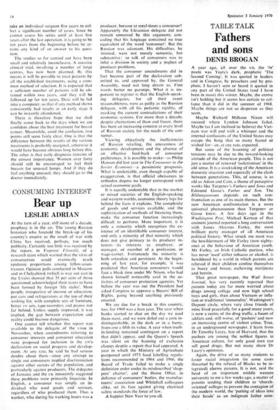CONSUMING INTEREST
Bear up
LESLIE ADRIAN
At the turn of a year, still more of a decade, prophecy is in the air. The young Russian historian who foretold the break-up of his country's empire as the result of war with China has received, perhaps, too much publicity. Certainly too little was received by the report, in Voprosy Filosofii, of a research team which warned that the virus of consumerism could eventually reach epidemic proportions among fellow-coun- trymen. Opinion polls conducted in Moscow and in Chelyabinsk (which is way out east in the Urals) showed that 35 per cent of those questioned acknowledged their tastes to have been formed by foreign 'life styles'. Most people, irrespective of income or education, put cars and refrigerators at the top of their wishing list, with complete sets of furniture, better t v sets, tape-recorders and pianos not far behind. Unless supply improved, it was implied, the gap between expectation and reality could become dangerous.
One cannot tell whether this report was available to the delegate of the USSR in November, when amendments referring to consumer interests and consumer education were proposed for inclusion in the UN.S• declaration on social progress and develop- ment. At any rate, he said he had serious doubts about them—since any attempt to single out consumers implied discrimination against other sectors of the population, and particularly against producers. The delegates of Jamaica and the UK innocently suggested these problems were primarily linguistic. In English, a consumer was simply an in- dividual who used goods and services, regardless of who produced them. Thus a worker, who during his working hours was a
producer, became at meal-times a consumer! Apparently the Ukrainian delegate did not remain unmoved by this argument; con- ceding that his language contained no true equivalent of the word 'consumer'. But the Russian was adamant. His difficulties, he insisted, were not merely semantic, but substantive: to talk of consumers was to infer a division in society and a neglect of producer problems.
That the consumer amendments did in fact become part of the declaration sub- mitted to, and approved by, the General Assembly, need not long detain us. Fine words butter no parsnips. What it is im- portant to register is that the English-speak- ing delegates, for all their sweet reasonableness, were as guilty as the Russian delegate, with all his pedantic rigidity, of masking the current contradictions of their economic systems. For more than a decade, despite alternations of thaw and freeze, there has been an increasing concern at every level of Russian society for the needs of the con- sumer.
Viewing objectively the inefficiencies of Russian retailing, the unevenness of economic development and the absence of an effective feed-back of consumer preferences, it is possible to make—as Philip Hanson did last year in The Consumer in the Soviet Economy—a pessimistic prognosis. What is undeniable, even though capable of exaggeration, is that official obeisances to orthodox dogma no longer correspond with actual economic goals.
It is equally undeniable that in the market or mixed societies of the English-speaking and western worlds, economic theory lags far behind the facts it explains. The complexity of goods and services available, and the sophistication of methods of financing them, make the consumer function increasingly difficult to perform. More important. it is only a minority which recognises the ex- istence of an identifiable consumer interest, and only a minority of that minority which does not give primacy to its producer in- terests—its interests as employer, or manager, or member of a profession, or wage-earner. Fortunately the minority is both articulate and persistent. At the begin- ning of last year, for example, • it was predicted that American consumers would face a bleak time under Mr Nixon, who had shown himself noticeably cool in the ac- tivities of consumer protection agencies. Yet before the year was out the President had asked Congress to approve a Buyers' Bill of Rights, going beyond anything previously enacted.
We are due for a break in this country, too; for 1969 was a lean year. The year when banks started to shut on the day we used them most, and we were doled out a coin in- distinguishable, in the dark or in a hurry, from one a fifth its value. A year when truth- in-lending remained contingent on a report that didn't appear, and the Queen's Speech was silent on the banning of exclusion clauses despite a report that had appeared. A year in which the Ministry of Agriculture postponed until 1973 food labelling regula- tions recommended in 1964 and 1966. the Board of Trade failed to make a single definition order under its misdescribed 'shop- pers' charter', and the Home Office, in defiance of consumers' bodies, the manufac- turers' association and Whitehall colleagues alike, set its face against giving electrical safety standards the force of law.
A happier New Year to you all.














































 Previous page
Previous page